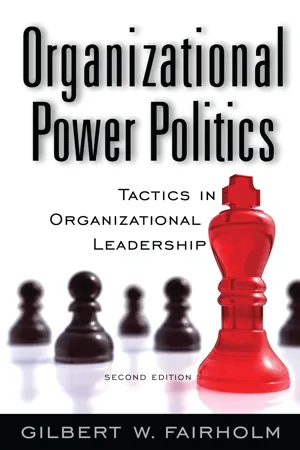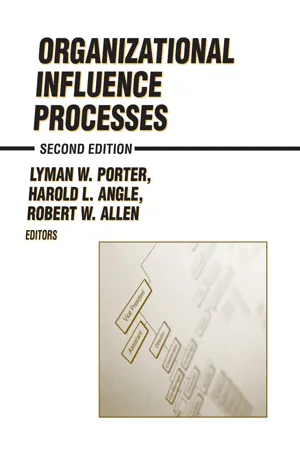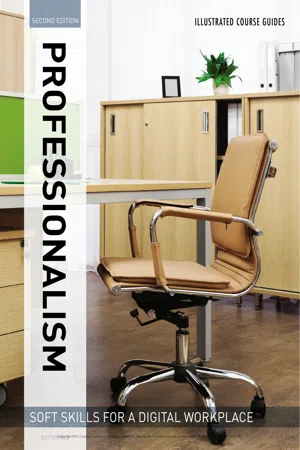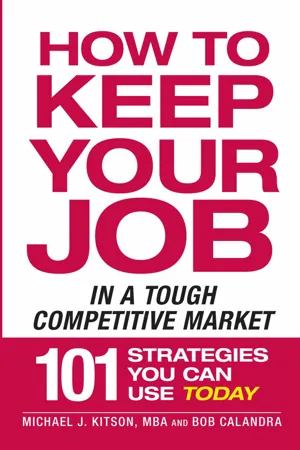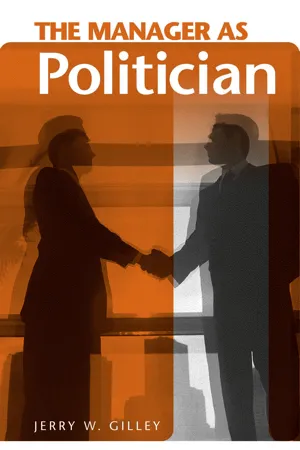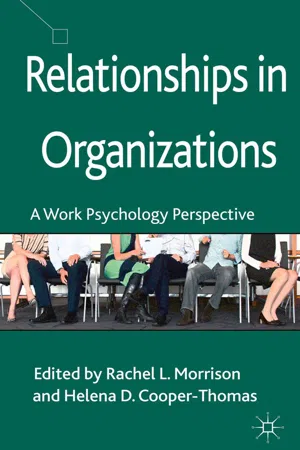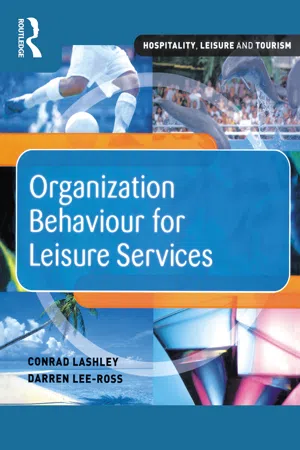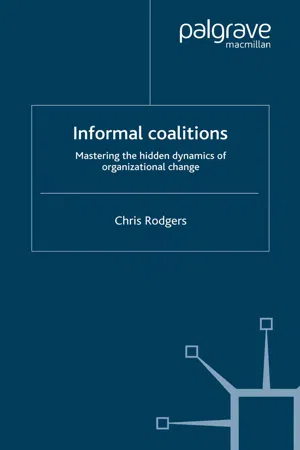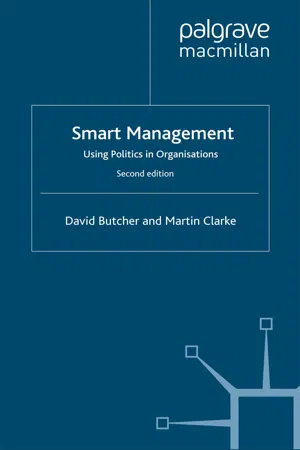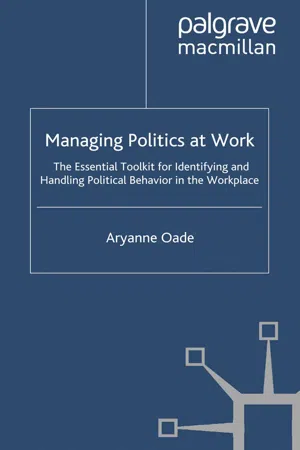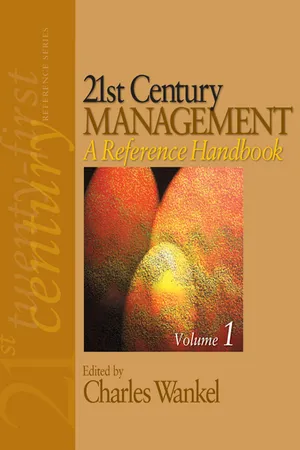Business
Office Politics
Office politics refers to the informal power struggles, alliances, and dynamics that occur within a workplace. It involves the competition for influence, recognition, and resources among employees. Office politics can impact decision-making, team dynamics, and overall work environment, and it's important for individuals to navigate these dynamics effectively to succeed in the workplace.
Written by Perlego with AI-assistance
Related key terms
1 of 5
12 Key excerpts on "Office Politics"
- eBook - PDF
Organizational Power Politics
Tactics in Organizational Leadership
- Gilbert W. Fairholm(Author)
- 2009(Publication Date)
- Praeger(Publisher)
Organizational politics, therefore, includes actions taken to gain and use power to control organizational resources to achieve our preferred results instead of those of others. This definition places organizational politics in the classroom when a teacher teaches. It is in the home as a father asks his child to do some- thing. It is in the office as the subordinate “manages” his or her boss by couching interaction upwards in ways calculated to induce the boss to respond favorably. And it is present when the manager orders employees to adopt a new procedure. David Bell (1975) emphasizes the “talk” aspect of organizational politics (1975). He says that traditional definitions of politics, as in who gets what, when, where and how, are not helpful. Getting control over needed resources can be, and often is, an intensely personal and private, even solitary affair, not a public one. Talk, on the other hand, always involves others and more consistently conforms to the definition of politics. Talk affects others and to that extent it is power (Duke, 1976). To the widest extent possible, organizational politics concerns how people affect each other. Political Behavior Given Bell’s (1975) definition of organizational politics, it is a commonplace activity in organizations. Madison, Allen, Porter, Renwich, and Maye’s (1980) research supports the idea that organizational politics is fully a part of organiza- tional life. Sixty percent of the managers he surveyed agreed that it was “frequently” or “very frequently” a part of organizational life. Most managers see organizational politics as a part of work life in the middle (Fairholm, M. R., 2002) and upper management levels and less so at the lower levels. Madison also reported that 95 percent of respondents agreed that Office Politics is necessary in achieving individual goals. They also were unanimous in saying that it could harm them. For Madison, engaging in organizational politics is a “crucial path” to success. - eBook - ePub
- Robert W. Allen, Lyman W. Porter, H.L. Angle(Authors)
- 2016(Publication Date)
- Routledge(Publisher)
An operationally useful definition of organization politics may include elements that Mayes and Allen (1977) called the management of influence. For them, organizational politics is a process that involves formulating political goals, decision strategies, and tactics. It entails executing those tactics and setting up feedback loops to ensure effective results. Organizational power politics is also defined in terms of a process of change (Coenen and Hofstra 1988). Defined in this way we can say that organizational politics is the essence of leadership.Organizational politics therefore includes actions taken to gain and use power to control organizational resources to achieve our preferred results instead of those of others. This definition places organizational politics in the classroom when a teacher “teaches.” It is in the home as a father asks his child to do something. It is in the office as the subordinate “manages” his or her boss by couching interaction upward in ways calculated to induce the boss to respond favorably. And it is present when the manager orders employees to adopt a new procedure.David Bell emphasizes the “talk” aspect of organizational politics (1975). He says traditional definitions of politics as who gets what, when, where, and how is not helpful. Getting control over needed resources can be, and often is, an intensely personal and private (even solitary) affair, not a public one. Talk, on the other hand, always involves others and more consistently conforms to the definition of politics. Talk affects others (Duke 1976), and to that extent it is power. To the widest extent possible, organizational politics concerns how people affect each other.Political Behavior
Given our definition of organizational politics, it is a commonplace activity in organizations. Research by Madison (1980) and others supports the idea that organizational politics is fully a part of organizational life. Sixty percent of managers he surveyed averred that it was “frequently” or “very frequently” a part of organizational life. Most managers see organizational politics as a part of work life at the middle and upper management levels and less so at the lower levels. - eBook - PDF
Illustrated Course Guides : Professionalism - Soft Skills for a Digital Workplace, 2e
Professionalism - Soft Skills for a Digital Workplace
- Jeff Butterfield(Author)
- 2016(Publication Date)
- Cengage Learning EMEA(Publisher)
UNIT D Professionalism D--1.doc D--2.doc D--3.doc D--4.doc D-5.doc -5.doc D-6.doc D-7.doc D-8.doc D-9.doc Files You Will Need Winning at Office Politics Office Politics is part of every business. Some people consider Office Politics as dishonest and manipulative. In a more neutral sense, Office Politics means influencing what happens at work and the way you work with other people. It is a practical part of securing promo-tions, selling your ideas to others, and gaining the support you need to achieve your goals. People who are successful with Office Politics earn the respect of others and know how to exchange favors. They also negotiate conflicts and contribute to difficult decisions with tact and ease. Winning at Office Politics will help advance your career and make your day-to-day work life run more smoothly. Tia Patterson is your supervisor at the Quest Specialty Travel branch in New York City. After hiring many new employees, Tia asked you to hold weekly training sessions on professionalism. This week, you are discussing how to build careers by succeeding at Office Politics. OBJECTIVES Understand the system Identify powerful people Cooperate with decision makers Develop diplomacy skills Choose your battles Cultivate allies Deal with negative politics Develop power and influence Copyright 2017 Cengage Learning. All Rights Reserved. May not be copied, scanned, or duplicated, in whole or in part. WCN 02-300 Understanding the System Every organization has a system for performing tasks, assigning resources, and rewarding accomplishments. Documents such as company handbooks and employee manuals describe parts of the system, such as how to earn vacation time. In contrast, another part of the system is rarely defined in writing. This part is called the political culture —the customs, attitudes, and practices that make a company unique. Experienced employees usually understand the political culture so well that they take it for granted. - Michael J Kitson, Bob Calandra(Authors)
- 2009(Publication Date)
- Adams Media(Publisher)
Part IV Master the Art of Office PoliticsT he very thought of Office Politics turns off many people. But the fact is, Office Politics can be a good thing. Political dynamics are the way business operates. It is the currency that gets things done in the workplace. It’s true that some Office Politics are destructive and dysfunctional. But contrary to what many people think, most Office Politics are above board and healthy. Whenever human beings form a group, there will always be a political dynamic. The challenge for employees is to understand how Office Politics work in their company. Once you do, you will be better prepared to engage, in a healthy way, and add value to your job. Plus, by participating you will learn about the destructive side of your office’s politics and be better able to avoid it.Passage contains an image
87. Make Office Politics Work for YouBefore you can save your job using your office’s political dynamic, you have to develop a keen self-awareness that not only allows you to understand what is going on, but to remain as balanced and objective as possible.For most employees, Office Politics and balance and objectivity are all but mutually exclusive ideas. Instead, most employees rush to judgment, pigeonholing the political dynamic in one of three categories— good, bad, or indifferent. The side they choose is good, which makes whoever is on the other side indifferent or bad.But the dynamic of Office Politics is much more involved and complex. To truly understand how it works, you must first be aware that during a bad business cycle the political dynamic becomes a free-for-all. Employees—let’s call them stakeholders— are all trying their best to do their best. But with each stakeholder reacting to the poor business climate by doing what he or she thinks is right and necessary to save the company, and oh by the way, his or her job, a confusion of personal strategies is let loose.- eBook - PDF
- Jerry W. Gilley(Author)
- 2005(Publication Date)
- Praeger(Publisher)
TWO Understanding Power, Politics, and Influence in Organizatio ns The study of power, politics, and influence and its effects is critical to un- derstanding how organizations operate. The terms power and influence are often used interchangeably in the management literature; however, there are subtle, yet important, differences between these terms. For example, if an employee accepts a work assignment from you, that employee has been influenced by you. Power represents the capability to get someone to do something; influence is the exercise of that capability. Organizational politics can be defined as those actions taken within an organization to acquire, develop, and use power and other resources to obtain one's preferred outcome in a situation in which there is uncertainty (or lack of consensus) about choices. Organizational politics arise when different groups pursue differing goals, and/or goals are unclear or am- biguous. It also arises when organizational and individual effectiveness is difficult to assess or goal achievement is prevented due to environmental turbulence. Organizational influence refers to your ability to acquire the needed power to achieve results within the organization. It also includes the abil- ity to motivate others and to persuade them to engage in activities or pro- duce results they would otherwise not produce. Organizational influence 20 / The Manager as Politician sometimes refers to your ability to resolve conflicts, enhance communica- tions, and build collaborative, synergistic relationships. To become a success political navigator, you need to develop an un- derstanding of several critical components of organizational survival: (1) power, (2) power tactics, (3) political behavior, (4) political influence tactics, (5) political conflict, and (6) conflict management styles. - eBook - ePub
Relationships in Organizations
A Work Psychology Perspective
- R. Morrison, H. Cooper-Thomas, R. Morrison, H. Cooper-Thomas(Authors)
- 2013(Publication Date)
- Palgrave Macmillan(Publisher)
Workplace politics is something that few admit they engage in at work, but everybody loves to talk about. While researchers often view politics as, at best, a necessary evil, most practitioners view it as the way things get done. Perhaps due to the negative connotations researchers have about the construct, there is often misunderstanding regarding the precise nature of politics in organizations. In order to more clearly discuss the topics throughout this chapter, we offer the following description of our key constructs.First, organizational politics, in general, is the use of power and social influence to affect organizational functioning, decision-making, and individual behavior while achieving goals in the face of uncertainty (Drory & Romm, 1988; Ferris et al., 2002; Ferris et al., 1989; Gandz & Murray, 1980; Pettigrew, 1973; Pfeffer et al., 1976). Although politics can be damaging and divisive (Gandz & Murray, 1980; Madison et al., 1980), Mintzberg (1983) asserted that it is ultimately just another system of influence that arises out of necessity as people seek to organize themselves to coordinated action, similar to authority or proscribed ideology. Organizational politics are more common in environments or situations that are ambiguous or have limited resources worth competing over. This is because goals and scarce resources are often obtained in such situations through the use of social influence behavior.In the workplace, social influence behaviors are typically referred to as political behaviors, and are actions that guide another individual’s thoughts or behaviors towards meeting one’s own self-serving or organization-serving ends (Ferris et al., 1989; Tedeschi & Melburg, 1984). When influencing others directly, political behaviors often take the form of influence tactics that engender in a target individual various levels of commitment to a particular task or behavior (Kipnis et al., 1980; Yukl & Tracey, 1992). For instance, inspiring a target to engage in a behavior by making it appear personally relevant may enhance a target’s commitment to a task or goal, while overtly pressuring them may cause resistance (Yukl et al., 1996). When seeking to affect others indirectly, however, political behavior may take the more subtle form of managing one’s impression in the eyes of others. Individuals may, for instance, render favors or give compliments in an effort to appear ingratiatory and thus likeable and deserving of favors, or may exemplify the ideal traits of an employee in their organization in an effort to appear devoted and thus deserving of trust and rewards (Jones & Pittman, 1982). While there are other, related forms of proactive and reactive political behavior (e.g. Tedeschi & Melburg, 1984), they all revolve around controlling the behavior of others to meet one’s own goals. - eBook - ePub
- Darren Lee-Ross, Conrad Lashley(Authors)
- 2012(Publication Date)
- Routledge(Publisher)
Another definition is helpful because it suggests that politics is about achieving something effectively and efficiently. In addition, ‘cunning’ is a human trait which once again infers that politics is subjective but may have an additional and negative connotation (depending on who benefits from the act of cunning). Indeed, in a work-aday sense, individuals frequently talk of organizational politics in this way as a barrier to personal goal achievement, personal development and success.Having read through the chapters in this book, you will realize that organizations are an extension of the human psyche; that is:- they are irrational and fraught with contradictions and frailties
- the workplace lives and breathes, contains paradoxes and conflicts because of the individuals who inhabit them
- in a service context this metaphor is particularly appropriate because of the role members play in service delivery (for example, see Chapter 4 )
- indeed, many writers consider that organizational politics exists and thrives because of the differences between the goals and aspirations of individual members (in addition to contextual matters).
Thus, by way of summary, both Robbins’s (2001) and McShane and Travaglione’s (2003) definitions seem wholly appropriate for the purpose of this chapter: ‘Activities that are not required as part of an individual’s formal role in the organization, but that influence, or attempt to influence, the distribution of advantages and disadvantages within the organization’ (Robbins, 2001: 362); ‘The attempts to influence others using discretionary behaviours to promote personal objectives’ or ‘It [organizational politics] is the exercise of power to get one’s own way, including acquisition of more power, often at the expense of others’ (McShane and Travaglione, 2003: 411).Key point 3.1Organizational politics concerns more than simply acknowledging models of political rule; rather, it is about understanding the infinite complexities and interplay between organizational members for their personal gain. - eBook - PDF
Informal Coalitions
Mastering the Hidden Dynamics of Organizational Change
- C. Rodgers(Author)
- 2006(Publication Date)
- Palgrave Macmillan(Publisher)
It is the process through which differ- ences in self-interest and organizational agendas are played out. From an informal coalitions perspective, organizational vitality and success depend on effective political processes. These provide energy, enable differences to be dealt with effectively and organizationally beneficial results to be achieved in a complex and uncertain environment. However, the informal coalitions view also recognizes that these same processes can easily degenerate into destructive conflict and lead to organization- ally dysfunctional effects, if they become overly defensive, parochially focused or corrupt. Where these differences are dealt with in self-serving and manip- ulative ways, which ride roughshod over other people’s interests and the well-being of the organization, the negative political game playing most readily identified with organizational politics comes to the fore. Acting politically 133 However, where these same dynamics are approached from a politically aware, ethical and organizationally enhancing standpoint, acting polit- ically provides one of the keys for transforming ordinary performance into extra-ordinary performance. Functional politics is therefore about managing differences in ways that are both organizationally enhancing and which serve the legitimate interests of organizational members – including their own. In practical terms, this means using power to modify the knowledge, attitudes and behaviors of key stakeholders in relation to important issues and events. As with talk and politics, though, power is an aspect of organizational dynamics that sits uncomfortably with most managers. The nature of power I often ask groups of managers how important they feel it is for them to have power in their organizations. - eBook - PDF
Smart Management
Using Politics in Organizations
- D. Butcher, M. Clarke(Authors)
- 2008(Publication Date)
- Palgrave Macmillan(Publisher)
These images are just too powerful not to spill over into parallels with organisational life, where formal authority is similarly often seen to be abused for personal gain. This pers- pective is amply demonstrated by the results of a survey under- taken by the authors 6 among senior managers from a diverse range of organisations, who had all embarked on substantial change initiatives. 16 Smart Management The managers were asked questions about how they intro- duced their changes, what resistance and co-operation they experienced and how this was managed. Well over half the survey reported that key decision-makers and bosses were resistant to the ideas put forward by managers. In forty-four per cent of these cases, formal authority was used to block the ideas, rather than good logical argument. Just old-fashioned ‘I’m the boss’, with no further explanation offered. The interpretations placed on this resistance from decision-makers by those introducing the change were very revealing. To them, the underlying causes were to do with personal self-interest It is not surprising, therefore, to find managers using words such as ‘secrecy’, ‘lobbying’ and ‘spin’ to describe organisational and governmental politics alike. Even in the world of business schools, where such emotive descriptions should be replaced with analytical enquiry, politics have been viewed as an ‘ugly duck- ling’, ‘a distasteful but persistent phenomenon’ and an ‘irrational intrusion’. 7 Certainly, many academics recognise the pluralistic nature of organisations, but nevertheless, in standard texts on organisational behaviour, politics usually only warrant a sub- heading in a chapter with a title such as ‘power and conflict’. Cast as merely another aspect of organisational life to be considered by the student of human behaviour, the centrality and role of politics tend to be obscured and marginalised. All these factors combine to create a negative conception of political activity in organisations. - eBook - PDF
Managing Politics at Work
The Essential Toolkit for Identifying and Handling Political Behaviour in the Workplace
- Aryanne Oade(Author)
- 2009(Publication Date)
- Palgrave Macmillan(Publisher)
97 CHAPTER 8: T OOL FOUR Power and Politics: Bringing Your Plans to Fruition The case study from the last chapter illustrated how political mis- judgments by two colleagues resulted in them taking ill-advised steps and undermining their relationships with their manager. What they wanted to do – play a role in the launch of a new initiative – was fair enough, but the way in which they went about it let them down. They failed to show sufficient respect for their manager and to think through the political ramifications of their actions both for him and for themselves. If they had taken a different tack – one that involved approaching their manager with their ideas and working with him to get things done in a way he sanctioned – the outcome could have been very different and much better for them. The case study illustrated that, before initiating any significant proposals, you need to consider the impact of your plans on those affected by them, especially those senior to you who have a vested interest in the outcome of your work, and whose opinion of you can be adversely affected if you handle things poorly. Let’s now continue our examination of how to work effectively with other people in your workplace and extend it to include how to use the power available to you in your role to get things done, especially when you: Need to work in tandem with other people. Want to gain support for plans and proposals that you want to initiate. This chapter will examine the reality of workplace power; what it is, where it comes from, how to preserve it from colleagues who’d like to take it from you and how to use it to build influence. The chap- ter will highlight how you can make the most of the organizational and personal power available to you in your role. It will show you how to get the best from the opportunities you have to influence and A. Oade, Managing Politics At Work © Aryanne Oade 2009 - eBook - PDF
- Julian Barling, E. Kevin Kelloway, Michael R. Frone, Julian Barling, E . Kevin Kelloway, Michael R. Frone(Authors)
- 2004(Publication Date)
- SAGE Publications, Inc(Publisher)
Organizational Politics Ken Harris K. Michele Kacmar 353 14 L ike stress, politics is ubiquitous in organizations. Perhaps because of its omnipresence, agreement on a definition of politics is difficult to reach. There have been numerous definitions of organizational politics presented in the literature including an entire article devoted to defining the construct (Drory & Romm, 1990). Although a number of different aspects of the def-inition were discussed by Drory and Romm, they failed to offer their own definition. In a recent review piece, Kacmar and Baron (1999) drew on the work of Drory and Romm as well as other conceptualizations to arrive at the following definition: “Organizational politics involves actions by individuals which are directed toward the goal of furthering their own self-interests without regard for the well-being of others or their organization” (p. 4). We will use this as the working definition for this chapter. In addition to both being ever-present in organizations, stress and politics share a number of other common characteristics. For example, politics, like stress, is subjective and rests in the eye of the beholder. Exposure to a particular person, event, or environment often results in different levels of perceptions of political activity and experienced stress. Events perceived as political or stressful also produce different behavioral reactions in individu-als. Some may try to flee the political or stressful situation by permanently (i.e., turning over) or temporarily (i.e., increased absenteeism or mentally checking out) exiting, whereas others may be invigorated by the situation and use the resulting adrenal rush that comes from being exposed to political behavior or a stressor to motivate themselves to rise to the challenge or use the situation to their advantage. - Charles Wankel, Charles B. Wankel(Authors)
- 2007(Publication Date)
- SAGE Publications, Inc(Publisher)
211 71 O RGANIZATIONAL P OLITICS IN M ANAGEMENT S ETTINGS H UNTER L. H ARRIS Vanderbilt University P olitical behavior is a phenomenon that has been pres-ent across interpersonal, group, and organizational settings for hundreds, if not thousands, of years. In fact, Aristotle argued centuries ago that man is an inherently political animal, and few have challenged that notion since. This phenomenon has become an increasingly important is-sue for business practitioners to understand and manage due to the changing organizational dynamics affecting today’s workforce. As managers become increasingly aware of the highly elastic nature of their organization’s investment in human capital, they realize how many important intangibles come into play and must bring newfound attention to these fac-tors. Organizational politics is a significant factor that has a profound impact on the effectiveness of the workforce. Managers will need to know what factors are primary driv-ers in creating a consistently effective environment and minimizing negative political behaviors, thus predisposing their organizational members to achieve their maximum potential. This chapter will discuss views on how politics and po-litical behavior are defined, the life cycle of their complex dynamics in and across the organization, and how they can best be understood and managed in the workplace of the 21st century. Politics will be explored across macro and micro levels of analysis and will reflect the different primary streams of research. The topic will be investigated from different fields of research such as social psychol-ogy and sociology as well as from different points of view within and across disciplines. This perspective will illus-trate the evolution of this field that has come from a diverse background to a multidisciplinary approach that is gaining momentum.
Index pages curate the most relevant extracts from our library of academic textbooks. They’ve been created using an in-house natural language model (NLM), each adding context and meaning to key research topics.
